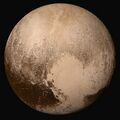Astronomy:2015 AZ43
| Discovery[1] | |
|---|---|
| Discovered by | Pan-STARRS (F51) |
| Discovery date | 11 January 2015 |
| Designations | |
| 2015 AZ43 | |
| Minor planet category | |
| Orbital characteristics[2] | |
| Epoch 13 January 2016 (JD 2457400.5) | |
| Uncertainty parameter 5 | |
| Observation arc | 45 days |
| |{{{apsis}}}|helion}} | 2.75773 astronomical unit|AU (412.551 Gm) (Q) |
| |{{{apsis}}}|helion}} | 0.98830226 AU (147.847914 Gm) (q) |
| 1.87301 AU (280.198 Gm) (a) | |
| Eccentricity | 0.472347 (e) |
| Orbital period | 2.56 yr (936.29 d) |
| Mean anomaly | 123.5461° (M) |
| Mean motion | 0° 23m 4.187s / day (n) |
| Inclination | 4.52198° (i) |
| Longitude of ascending node | 337.42980° (Ω) |
| 181.78786° (ω) | |
| Earth MOID | 0.00161778 AU (242,016 km) |
| Jupiter MOID | 2.23908 AU (334.962 Gm) |
| Physical characteristics | |
| Dimensions | |
| Rotation period | 0.59992 h (35.995 min) |
| Absolute magnitude (H) | 23.5[2] |
2015 AZ43 (also written 2015 AZ43) is an Apollo near-Earth asteroid roughly 70 meters in diameter. On 10 February 2015 with a 29.5-day observation arc, it showed a 1 in 5,880 chance of impacting Earth on 27 February 2107.[3] However, the NEODyS nominal best-fit orbit shows that 2015 AZ43 will be 2.8 astronomical unit|AU (420,000,000 km; 260,000,000 mi) from Earth on 27 February 2107.[5] A (non-impacting) Earth close approach in 2056 makes future trajectories diverge.[6] It was removed from the JPL Sentry Risk Table on 23 February 2015 using JPL solution 26 with an observation arc of 40 days that included radar data.[7]
With an absolute magnitude of 23.5,[2] the asteroid is about 50–120 meters in diameter.[4]
2015 flyby
2015 AZ43 was discovered on 11 January 2015 by Pan-STARRS at an apparent magnitude of 20 using a 1.8-meter (71 in) Ritchey–Chrétien telescope.[1] On 15 February 2015 the asteroid passed 0.0197 astronomical unit|AU (2,950,000 km; 1,830,000 mi) from Earth.[8] The Goldstone Deep Space Network detected the asteroid on 18–19 February 2015, but the signal was not strong enough for delay-Doppler imaging.[9]
References
- ↑ 1.0 1.1 "MPEC 2015-B05: 2015 AZ43". IAU Minor Planet Center. 2015-01-16. http://www.minorplanetcenter.net/mpec/K15/K15B05.html. (K15A43Z)
- ↑ 2.0 2.1 2.2 2.3 "JPL Small-Body Database Browser: (2015 AZ43)". Jet Propulsion Laboratory. http://ssd.jpl.nasa.gov/sbdb.cgi?sstr=2015AZ43.
- ↑ 3.0 3.1 "Earth Impact Risk Summary: 2015 AZ43". WayBack Machine: NASA/JPL Near-Earth Object Program Office. 2015-02-10. http://neo.jpl.nasa.gov/risk/2015az43.html.
- ↑ 4.0 4.1 "Absolute Magnitude (H)". NASA/JPL. http://neo.jpl.nasa.gov/glossary/h.html.
- ↑ "2015AZ43 Ephemerides for 25 February 2107 through 2 March 2107". NEODyS (Near Earth Objects – Dynamic Site). http://newton.spacedys.com/neodys/index.php?pc=1.1.3.1&n=2015AZ43&oc=500&y0=2107&m0=2&d0=25&h0=0&mi0=0&y1=2107&m1=3&d1=2&h1=0&mi1=0&ti=1.0&tiu=days.
- ↑ "2015AZ43 close approaches". NEODyS (Near Earth Objects – Dynamic Site). http://newton.spacedys.com/neodys/index.php?pc=1.1.8&n=2015AZ43.
- ↑ "Date/Time Removed". NASA/JPL Near-Earth Object Program Office. http://neo.jpl.nasa.gov/risk/removed.html.
- ↑ "JPL Close-Approach Data: (2015 AZ43)". http://ssd.jpl.nasa.gov/sbdb.cgi?sstr=2015AZ43;cad=1#cad.
- ↑ Lance A. M. Benner. "Goldstone Asteroid Schedule". NASA/JPL Asteroid Radar Research. http://echo.jpl.nasa.gov/asteroids/goldstone_asteroid_schedule.html.
External links
- 2015 AZ43 Orbit – Minor Planet Center
- 2015 AZ43 at NeoDyS-2, Near Earth Objects—Dynamic Site
- Ephemeris · Obs prediction · Orbital info · MOID · Proper elements · Obs info · Close · Physical info · NEOCC
- 2015 AZ43 at ESA–space situational awareness
- 2015 AZ43 at the JPL Small-Body Database
 |




